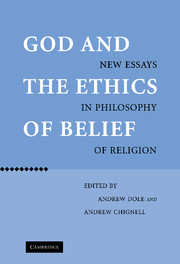Book contents
- Frontmatter
- Contents
- List of Contributors
- Acknowledgments
- The Ethics of Religious Belief: A Recent History
- PART ONE METAPHYSICS: GOD AND CREATURES
- 1 Can God Break the Laws?
- 2 Sleeping Beauty and the Afterlife
- 3 Free Will, Evil, and Divine Providence
- 4 Two Cheers for Mystery!
- PART TWO EPISTEMOLOGY: GOD AND THE ETHICS OF BELIEF
- PART THREE SOCIAL-POLITICAL PHILOSOPHY: GOD, ETHICS, AND BELIEF
- Index
- References
4 - Two Cheers for Mystery!
Published online by Cambridge University Press: 25 July 2009
- Frontmatter
- Contents
- List of Contributors
- Acknowledgments
- The Ethics of Religious Belief: A Recent History
- PART ONE METAPHYSICS: GOD AND CREATURES
- 1 Can God Break the Laws?
- 2 Sleeping Beauty and the Afterlife
- 3 Free Will, Evil, and Divine Providence
- 4 Two Cheers for Mystery!
- PART TWO EPISTEMOLOGY: GOD AND THE ETHICS OF BELIEF
- PART THREE SOCIAL-POLITICAL PHILOSOPHY: GOD, ETHICS, AND BELIEF
- Index
- References
Summary
One finds in contemporary Anglo-American analytic philosophy of religion what looks to be a considerable degree of confidence in human powers to determine what God is like; how to construe his basic attributes; and what his purposes, plans, standards, values, and so on are – and to determine these in some detail. I do not suggest that anyone thinks we can attain a comprehensive knowledge of God's nature and doings. But on many crucial points, there seems to be a widespread confidence in our ability to determine exactly how things are with God.
There are lively arguments as to whether God's being is temporal or atemporal; whether God is free in various respects – free to do wrong, free to either create something(s) other than himself or not, free to create something less than a best of all possible worlds; whether God has obligations; what the conditions are under which God permits suffering, for example, whether it is only on condition that the suffering is necessary for some good (or avoidance of evil) that outweighs it, or only on condition that it is necessary for a benefit to the sufferer that outweighs it; whether God undergoes emotional states, whether, for example, he is pained by human wrongdoing. The topic of divine knowledge is a particularly rich field for such investigations. Does God have foreknowledge of human free actions? Does God have “middle knowledge” – knowledge of what free choice a given human being would make in a certain possible situation?
- Type
- Chapter
- Information
- God and the Ethics of BeliefNew Essays in Philosophy of Religion, pp. 99 - 114Publisher: Cambridge University PressPrint publication year: 2005
References
- 5
- Cited by



